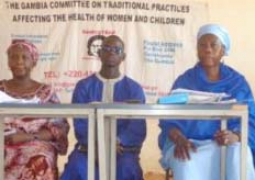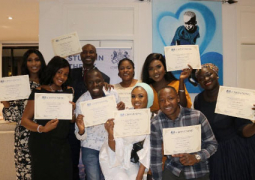The
As part of its strategic activities, the three implementing partners are currently on a nationwide sensitization tour targeting active female members of various political parties with political interests and ambitions.
The two-year pilot project was designed to target women from all regions to equip them with the knowledge and skills to effectively participate in the democratic and political process of The Gambia.
Among the tools being utilised in the implementation of this project are national and international instruments such as the Convention on the Elimination of All Forms of Discrimination Against Women (CEDAW) international instruments, the Millennium Development Goal 3 on gender equality and empowerment, and the 2010 Women’s Act.
At a forum held in Basse, Upper River Region, female participants discussed and debated on issues affecting the participation of women at the level of decision-making and the need to increase the number in light of the National Assembly and Local Government elections.
The women also shared their experiences as well as their challenges.
The women lamented over their lack of education and the fact that most of the committees are dominated by men.
Other women mentioned the difficulties faced when elected in some committees and how all too often they are considered unsuitable.
Musa Sanneh, the URR focal person of WANEP –
Pamela Cole, national coordinator of WANEP, says the ultimate aim is to empower women as well as to increase the number of women in decision-making structures to enable them be at local government or national assembly positions.
She noted that they also want to encourage women to seek and attain decision-making roles in the government, with emphasis to enhance women’s involvement and participation in democratic governance and decision-making processes at all levels.
Ms Cole also added that WANEP is one of the national chapters established in 2003, with a membership of thirty registered civil society organizations, that are involved in diverse fields of development work.
The establishment of WANEP-Gambia has provided a platform for individuals and organizations interested in peace or involved in peace-building programmes and activities, she noted.
For her part, Michelle Jawo Demba, programme coordinator of Pro-Hope, said the women empowerment process is not about party representation but about an increment of the number of women in decision-making processes at all levels.
It is high time that women had equal representation in all aspects of walks of life for them to push their agenda forward, Mr Jawo-Demba noted, saying that Pro-Hope International is a civil society organization that mainly focuses on gender-based violence and reproductive health issues targeting women and youths, with occasional male involvement.
For their parts, Jarai Jawneh, Soma Jallow, Meita Sillah, Sirah Manneh, among other speakers, said issues such as low level of education, lack of awareness on their political rights, and high level of poverty, make women feel shy to actively participate in politics or decision-making processes.
Some of the recommendations for the way forward that emanated from the discussion are to break the cycle of poverty through education, to unite among themselves, to let them see each other as one in the same country, to let them stop taking each other to marabous for destruction, among other remedial steps, to be able to influence change and involve in the decision-making process of their country.
Read Other Articles In Article (Archive)



